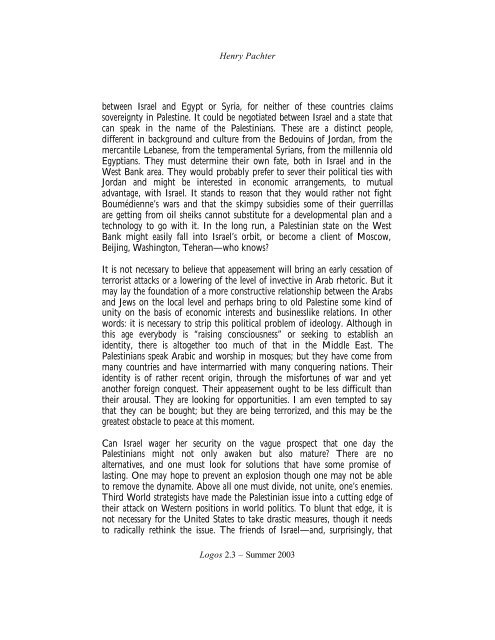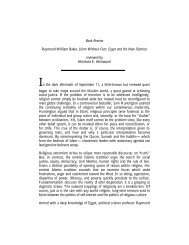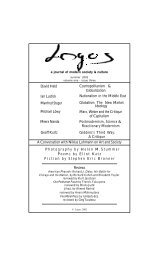Michael J. Thompson Stephen Eric Bronner Wadood Hamad - Logos
Michael J. Thompson Stephen Eric Bronner Wadood Hamad - Logos
Michael J. Thompson Stephen Eric Bronner Wadood Hamad - Logos
Create successful ePaper yourself
Turn your PDF publications into a flip-book with our unique Google optimized e-Paper software.
Henry Pachter<br />
between Israel and Egypt or Syria, for neither of these countries claims<br />
sovereignty in Palestine. It could be negotiated between Israel and a state that<br />
can speak in the name of the Palestinians. These are a distinct people,<br />
different in background and culture from the Bedouins of Jordan, from the<br />
mercantile Lebanese, from the temperamental Syrians, from the millennia old<br />
Egyptians. They must determine their own fate, both in Israel and in the<br />
West Bank area. They would probably prefer to sever their political ties with<br />
Jordan and might be interested in economic arrangements, to mutual<br />
advantage, with Israel. It stands to reason that they would rather not fight<br />
Boumédienne’s wars and that the skimpy subsidies some of their guerrillas<br />
are getting from oil sheiks cannot substitute for a developmental plan and a<br />
technology to go with it. In the long run, a Palestinian state on the West<br />
Bank might easily fall into Israel’s orbit, or become a client of Moscow,<br />
Beijing, Washington, Teheran—who knows?<br />
It is not necessary to believe that appeasement will bring an early cessation of<br />
terrorist attacks or a lowering of the level of invective in Arab rhetoric. But it<br />
may lay the foundation of a more constructive relationship between the Arabs<br />
and Jews on the local level and perhaps bring to old Palestine some kind of<br />
unity on the basis of economic interests and businesslike relations. In other<br />
words: it is necessary to strip this political problem of ideology. Although in<br />
this age everybody is “raising consciousness” or seeking to establish an<br />
identity, there is altogether too much of that in the Middle East. The<br />
Palestinians speak Arabic and worship in mosques; but they have come from<br />
many countries and have intermarried with many conquering nations. Their<br />
identity is of rather recent origin, through the misfortunes of war and yet<br />
another foreign conquest. Their appeasement ought to be less difficult than<br />
their arousal. They are looking for opportunities. I am even tempted to say<br />
that they can be bought; but they are being terrorized, and this may be the<br />
greatest obstacle to peace at this moment.<br />
Can Israel wager her security on the vague prospect that one day the<br />
Palestinians might not only awaken but also mature? There are no<br />
alternatives, and one must look for solutions that have some promise of<br />
lasting. One may hope to prevent an explosion though one may not be able<br />
to remove the dynamite. Above all one must divide, not unite, one’s enemies.<br />
Third World strategists have made the Palestinian issue into a cutting edge of<br />
their attack on Western positions in world politics. To blunt that edge, it is<br />
not necessary for the United States to take drastic measures, though it needs<br />
to radically rethink the issue. The friends of Israel—and, surprisingly, that<br />
<strong>Logos</strong> 2.3 – Summer 2003




